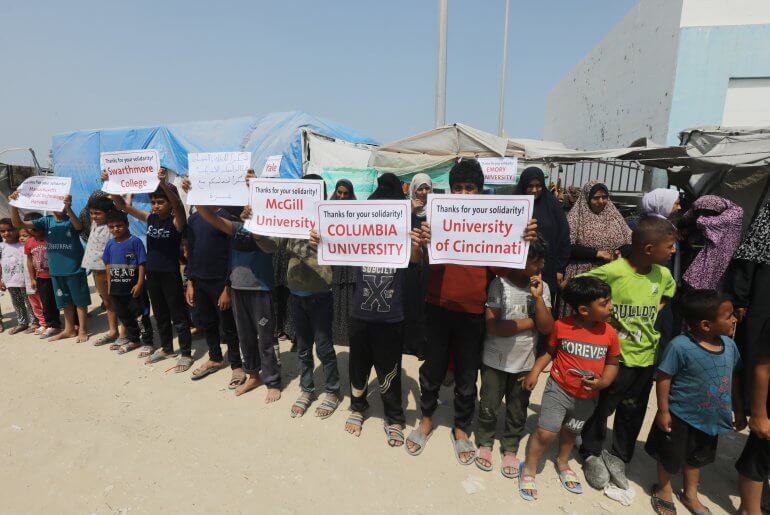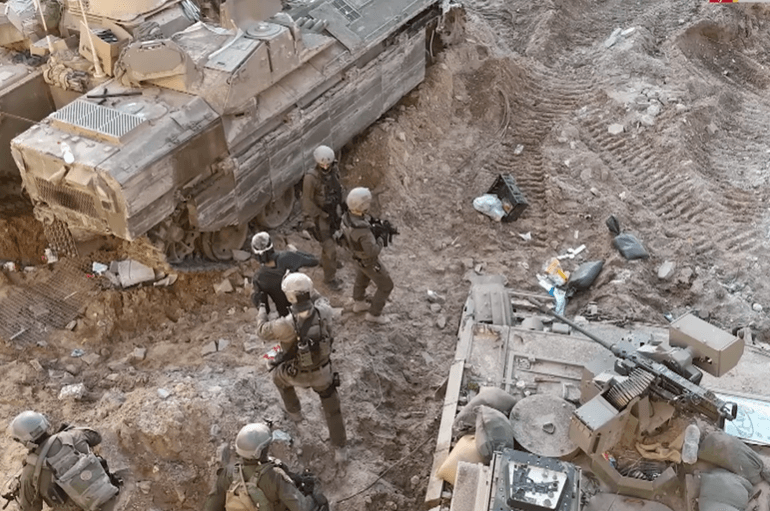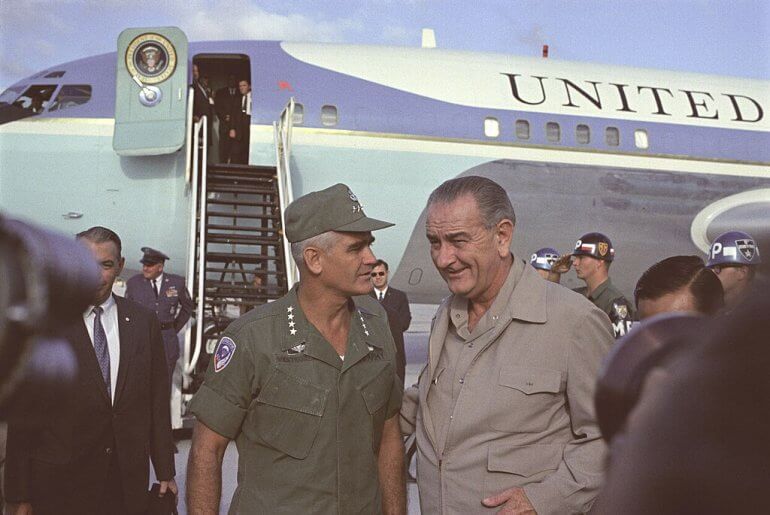Palestinians plan to continue protests this week, in hopes of rousing focus on the Israeli blockade over Gaza after 24 were wounded over the weekend in a demonstration planned by Hamas. Tensions again climbed today when Israel attacked Gaza in the early morning hours and Palestinians floated balloons fastened with incendiary devices into Israel, a rudimentary weapon use to set fires.
“In response to Hamas’ renewed attacks today, we struck a weapons manufacturing site, rocket launch site & tunnel entrances in Gaza,” the Israel military said today over social media. “We will continue to respond firmly against all terrorist activities from Gaza.”
On Saturday Israeli forces fired live rounds and tear gas, critically wounding a 13-year- old Palestinian boy who was shot in the head, according to Palestinian health officials. At least one Palestinian was filmed firing a pistol towards Israelis soldiers, and one Israeli border police officer was shot in the head and critically wounded. That evening Israel’s military said it fired airstrikes on four “Hamas weapons and storage manufacturing sites.”
Israel’s Prime Minister Naftali Bennett said Sunday, “We will settle accounts with anyone who harms our fighters or Israeli civilians.”
The protest trailed a northern fence that separates Gaza from Israel and was a frequent site for popular demonstrations that began in 2018 known as the Great March of Return. Those marches were independently organized while Saturday’s was called for by Hamas and backed by supporting factions.
Senior Hamas official Yayha Mousa confirmed Saturday’s activities were not part of reinvigorating the Great March of Return. “Palestinian factions will create new tools for struggle,” he said. “Palestinians in Gaza are facing death, all that they do is push death away from them, this is their struggle.”
Talal Abu Zarifa, a commissioner behind the Great March of Return confirmed the latest protest was not affiliated with the 2018 border protests. He said a second rally would follow on Wednesday in the southern city of Khan Younis, also organized by Hamas and a coalition of Palestinian factions.
“We can’t stand doing nothing while our people are suffering death due to Israeli siege,” he explained. “No calls were made to restart the Great March of Return, but there are different steps the factions planned in order to reach the international community to end the siege on Gaza and intervene on Israeli practices against Palestinians.”
A representative for Saturday’s confrontation, Mahmoud Khalaf, said the event sought to “end the siege of Gaza and bans on the reconstruction process that prevents the people of Gaza from their right to live in freedom.”
Khalaf indicated the date was selected as a solemn marker on the anniversary of an attempt to burn down the Al-Aqsa Mosque 52 years ago that caused a severe blaze to Islam’s second most holy site. On August 21, 1969, Australian Christian extremist Denis Michael Rohan poured a thermos of kerosene inside the mosque and destroyed an 800-year-old pulpit in order to incite a religious war and bring about the apocalypse. Rohan was initially prosecuted by Israel and later extradited to Australia. The fallout from the incident caused a wave of protests in the region, falsely believed by many to have been caused by Israel.
Khalaf said Egyptian mediators, who brokered a ceasefire last May between Israel and Hamas after a recent escalation that left 242 Palestinians and 13 in Israel dead, were informed Hamas intends to continue border protests.
Yesterday, Egyptian officials closed the Rafah checkpoint with Gaza, suspending all passengers through travel for an undetermined period of time. An Egyptian official who spoke to the Associated Press under the condition of anonymity and was not authorized to make a statement said the crossing was shut in response to rising tensions from Saturday’s demonstration. He said Cairo and Gaza had “differences” over a fragile ceasefire signed in last May.
“This is a devastating development for thousands of people with hopes, dreams, plans, and above all, human rights that must be protected,” said Tania Hary, the executive director of the Israeli human rights group Gisha. “Egypt and Israel must respect the right to freedom of movement.”

Qatari aid to resume in Gaza
Late last week Qatar said it had reached a deal with Israel, Palestinian leaders, and the United Nations to resume cash transfers to Gaza that were suspended due to the fighting in May. The pause in the aid has been a major source of frustration inside of Gaza.
During the ceasefire discussions, Israel negotiated how the money would be used and enter Gaza. Previously, around $30 million was delivered each month in cash sent through an Israeli checkpoint. The funds supported 100,000 families with disbursements of $100 each month.
An agreement was reached last week where the UN will handle the process of moving the funds from New York, to Ramallah, to Gaza, all under Israeli observation, including oversight of the recipient list. The money transfers will resume in September.
Tareq S. Hajjaj
Tareq S. Hajjaj is a freelance journalist and a member of Palestinian Writers Union. He studied English Literature at Al-Azhar university in Gaza. He started his career in journalism in 2015 working as news writer/translator at the local newspaper Donia al-Watan. He has reported for Elbadi, the Middle East Eye, and Al Monitor.




1 of 2
Lest we forget:
To quote the independent and highly respected human rights organization Human Rights Watch: “…Israel will continue to be an Occupying Power [of the Gaza Strip] under international law and bound by the provisions of the Fourth Geneva Convention because it will retain effective control over the territory and over crucial aspects of civilian life. Israel will not be withdrawing and handing power over to a sovereign authority – indeed, the word ‘withdrawal’ does not appear in the [2005 disengagement] document at all… The IDF will retain control over Gaza’s borders, coastline, and airspace, and will reserve the right to enter Gaza at will. According to the Hague Regulations, ‘A territory is considered occupied when it is actually placed under the authority of the hostile army. The occupation extends only to the territory where such authority has been established and can be exercised’. International jurisprudence has clarified that the mere repositioning of troops is not sufficient to relieve an occupier of its responsibilities if it retains its overall authority and the ability to reassert direct control at will.”
The International Committee of the Red Cross (ICRC): “The whole of Gaza’s civilian population is being punished for acts for which they bear no responsibility. The closure therefore constitutes a collective punishment imposed in clear violation of Israel’s obligations under international humanitarian law.” The ICRC thus unequivocally stated that Israel’s blockade of the Gaza Strip constitutes a violation of international humanitarian law embodied in the Geneva Conventions. The Fourth Geneva Convention of 1949, ratified by Israel, bans collective punishment of a civilian population.
2 of 2
To quote Dov Weisglass, then PM Ariel Sharon’s senior adviser:
“‘The significance of the [then proposed] disengagement plan [implemented in 2005] is the freezing of the peace process,’ Prime Minister Ariel Sharon’s senior adviser Dov Weisglass has told Ha’aretz. ‘And when you freeze that process, you prevent the establishment of a Palestinian state, and you prevent a discussion on the refugees, the borders and Jerusalem. Effectively, this whole package called the Palestinian state, with all that it entails, has been removed indefinitely from our agenda….’ Weisglass, who was one of the initiators of the disengagement plan, was speaking in an interview with Ha’aretz for the Friday Magazine. ‘The disengagement is actually formaldehyde,’ he said. ‘It supplies the amount of formaldehyde that is necessary so there will not be a political process with the Palestinians.’” (Top PM Aide: Gaza Plan Aims to Freeze the Peace Process, Ha’aretz, October 6, 2004)
“Palestinian factions will create new tools for struggle…. there are different steps the factions planned in order to reach the international community…”
Placards in English, are worthy of consideration in order to inform/reach the international community. Throwing could be held in abeyance to calculate the effect.
The leadership in Gaza cares little for the average citizen in the strip. All they have in mind is gaining control over the Al-Aksa mosque and surrounding areas. Standing in their way are 3 major hurdles, and as far as the Gazan’s are concerned none of the 3 will ever allow their wishes to come true.
All 3 care little for the Gazan’s. You can be sure about this. Instead of working to improve the standard of living in the Gaza Strip, the Palestinian leadership are manipulating the population there to sacrifice their lives in order to gain world attention. The Gazan’s want the UN to step in and offer “protection”. An so they fling women and children onto the fence hoping they will take a bullet and trigger a tear with some of the Mondoweiss faithful who have no idea what is really going on.
Check the timestamp of this post. I guarantee you that in approx. 14 hours time we are going to see Palestinians using live ammunition and bombs in order to provoke a violent response from Israeli troops.